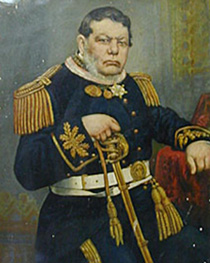David Canabarro
This article includes a list of general references, but it remains largely unverified because it lacks sufficient corresponding inline citations. (January 2013) |
David Canabarro | |
|---|---|
 | |
| Born | August 22 1796 Taquari, Principality of Brazil |
| Died | 1867 Santana do Livramento, Empire of Brazil |
David José Martins, known as David Canabarro, (born on August 22 1796 in Taquari) was a Brazilian general. He died in 1867 in Santana do Livramento.
Biography[]
Canabarro had ancestry from the Azores region of Portugal. He was born to José Martins Coelho of Porto Alegre and Dona Mariana de Jesus Ignacia of Santa Catarina Island.
The surname "Canabarro" came from his grandfather, Manuel Teodósio Ferreira, who received the nickname and added this title to his name.
Early military career[]
Campaigns against Artigas[]
Canabarro began his military career in the in 1811–1812. David, at the age of fifteen, asked his father's permission to take his brother's place.
Canabarro fought for the forces of noble Don . After the campaign he was promoted to Ensign and returned home, though later he would fight in the from 1816 to 1820.
Cisplatine War[]
Years later he was a lieutenant in the forces of Bento Gonçalves in the Cisplatine War in 1825–1828, which culminated in a peace treaty in August 1828 and the independence of Uruguay. There he played an important role in the , saving the Brazilian army on September 24, 1825. This earned him the title of Army lieutenant. He took part in the 21st Light Cavalry Brigade commanded by Bento Gonçalves and the undecided .
When the war ended, he continued his military career, this time associated with his uncle Antonio Ferreira Canabarro in the resort border of . By 1836, he adopted the name David Canabarro at the insistence of his uncle. As suggested by historian Ivo santanese Caggiano: "he must have had some connection with the axes and ferreiras of Sabrosa. Consequently, the descendants of the noble Canavarros of Portugal must be the Canabarro of Brazil."
Ragamuffin War[]
Canabarro was initially neutral in the Ragamuffin War. He later enlisted as a lieutenant, but quickly rose through the ranks, and took command in June 1843, when Bento Gonçalves (to avoid a split among Republicans) quit the command and went on to serve under the orders of Canabarro.
His only defeat in war was in the , which relaxed the peace negotiations he undertook with the . He was surprised by the troops of and was defeated, notwithstanding his possession of the .
While negotiating peace with the empire, Canabarro offered his services to Juan Manuel de Rosas, ruler of Argentina, who wanted to expand the borders of his country. In exchange for the cooperation of Ragamuffin, he would get help from Argentina to continue the battle against the empire. Canabarro responded by letter, where he stated his loyalty to the country.
As head of the rebels he accepted the amnesty offered by the government in December 18, 1844 by the Duque de Caxias, called "the Peacemaker". In the negotiations on February 25, 1845, it was agreed that Republicans would choose the next president of the province. It was also agreed that the imperial government would be held to account for the republican government's debt; that rebel military officers who wished to join the imperial army would remain in their former posts, and that the prisoners would be pardoned.
The Brazilian army[]
Canabarro fought in the and in the War against Aguirre, receiving the title of honorary general with which he fought the invaders in the Paraguayan War.
Representations in popular culture[]
David Canabarro has been portrayed as a character in film and television, played by in the movie Netto Loses His Soul (2001), and by in the miniseries (2003).
Bibliography[]
- . Illustrious Men of Rio Grande do Sul. Livraria Selbach, Porto Alegre, 1917.
- Caggiano, Ivo Caggiani. David Canabarro lieutenant of the general. Porto cheerful: Martin Book, 1992.
- 1796 births
- 1867 deaths
- People from Taquari
- Brazilian people of Azorean descent
- Brazilian rebels
- Heads of state of former countries